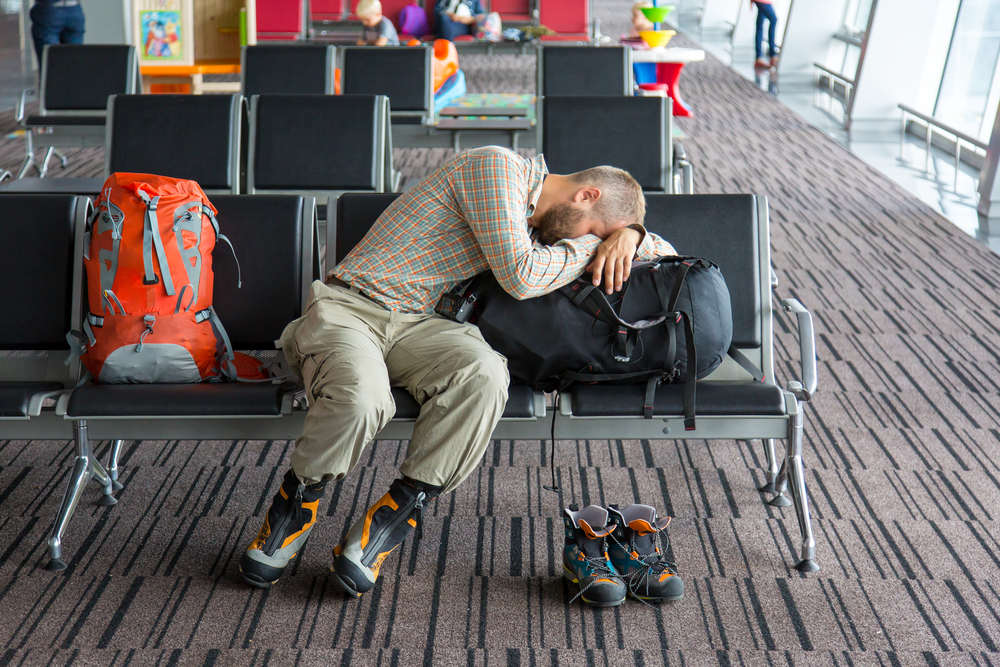Full-time travel isn’t always the dream life social media makes it seem.

Packing up and leaving home to explore the world sounds like the ultimate adventure, but long-term travel comes with a side most people don’t talk about. The glossy photos of sunsets and street markets don’t show the exhaustion, the loneliness, or the stress that can creep in when you’re constantly on the move. What starts as an exciting, free-spirited lifestyle can sometimes turn into something isolating and emotionally draining.
While full-time travel does bring incredible experiences, it also means dealing with unpredictability, a lack of stability, and the pressure to always be “making the most” of every place you visit. Friendships can feel fleeting, personal growth can become overwhelming, and homesickness hits harder than expected.
The emotional toll of being a permanent traveler isn’t something most people prepare for, but understanding the challenges can help make the lifestyle more sustainable in the long run.
1. Constantly being on the move leads to emotional burnout.

When you’re traveling full-time, excitement eventually gives way to exhaustion. The cycle of packing, unpacking, catching flights, and navigating new cities never really stops. What was once exhilarating can start to feel like a job, except there’s no real break from it. Even relaxing destinations require decision-making, and the mental load of constantly adjusting to new places takes a toll, according to the writers at Charlie Health.
Over time, the need to keep up the momentum can lead to burnout. You might find yourself in a stunning location but unable to appreciate it because your mind is drained. Travel stops feeling like an adventure and starts feeling like a checklist of places you’re supposed to enjoy. If you don’t find ways to slow down or take intentional breaks, the excitement that made you start traveling in the first place can disappear entirely.
2. Friendships become temporary, and loneliness creeps in.

Meeting new people on the road is easy, but forming deep, lasting connections is another story. While travelers bond quickly over shared experiences, goodbyes come just as fast. You might meet someone amazing, spend a few days exploring together, and then part ways, knowing you may never see them again. Over time, this pattern can make relationships feel fleeting and surface-level.
Loneliness isn’t just about being alone—it’s about lacking a consistent support system, as reported by Matthew Holman on LinkedIn. When tough times hit, you don’t always have close friends nearby to lean on. Video calls and social media help, but they don’t replace the comfort of having people who truly know you. After months or years of transient relationships, you might start craving the kind of friendships that don’t come with an expiration date.
3. The pressure to always be having fun becomes overwhelming.

When travel becomes your lifestyle, it’s easy to feel like you have to make every moment count. There’s a constant pressure to be exploring, taking photos, and experiencing everything a place has to offer. Slowing down or taking a rest day can feel like a waste, even when you’re exhausted. If you’re documenting your travels for social media, that pressure multiplies—every experience starts to feel like content instead of just life, as stated by Saloni Kabra of Emoneeds.
This mindset can quickly turn into emotional exhaustion. Instead of truly enjoying a destination, you might feel guilty for not doing enough. The need to always be in “adventure mode” can make simple pleasures feel inadequate. Eventually, this pressure can suck the joy out of travel, making it feel more like an obligation than a personal choice.
4. Homesickness can hit harder than expected.

Even if you were eager to leave home, full-time travel can make you miss the small, familiar things you once took for granted. Simple comforts like your favorite coffee shop, a couch that’s actually yours, or knowing exactly where to go for a quiet walk suddenly seem priceless. The longer you travel, the more those little things start to feel like a loss.
Holidays and special occasions can be especially tough. Watching family gatherings from a distance or missing birthdays and milestones can bring up feelings of guilt and sadness. No matter how incredible your travels are, there’s an undeniable ache that comes with not having a home base to return to.
5. Travel fatigue makes everything start to blur together.

At first, every new place feels exciting, but after a while, destinations start blending into one another. Cathedrals, beaches, markets, and even breathtaking landscapes can lose their impact when you’re experiencing them nonstop. The sense of wonder that once fueled your travels can fade, making even the most incredible places feel routine.
This kind of fatigue doesn’t just dull experiences—it can lead to frustration and irritability. Little inconveniences, like a delayed bus or a missed tour, suddenly feel like massive problems. When every day involves constant decision-making, even minor setbacks can become exhausting. If you don’t take time to slow down and process your experiences, the joy of travel can start slipping away.
6. A lack of routine can make life feel ungrounded.

Waking up every day with no set schedule sounds amazing at first, but after months or years on the road, a lack of routine can start to feel destabilizing. Simple things like meal planning, exercise, or even a consistent sleep schedule become harder to maintain when every day is unpredictable. Without structure, it’s easy to fall into unhealthy habits or feel a constant sense of restlessness.
Many travelers struggle with finding a balance between freedom and stability. When every week brings a new city or country, there’s no time to build steady habits. Over time, this lack of consistency can make you feel scattered, unproductive, or even disconnected from yourself. Having flexibility is great, but without any structure, full-time travel can start to feel chaotic instead of liberating.
7. Financial stress can turn travel into a constant worry.

Even budget travelers aren’t immune to financial stress. Constantly booking transportation, accommodations, and meals adds up, and unexpected expenses—like lost luggage, medical issues, or last-minute flight changes—can wreck your budget. If you’re working remotely or relying on savings, the uncertainty of how long you can sustain your travels can create a constant undercurrent of anxiety.
Money stress can also limit experiences. You might find yourself skipping bucket-list activities because they’re too expensive, or choosing uncomfortable accommodations just to save a few bucks. Over time, constantly calculating costs can make travel feel less like an adventure and more like a financial balancing act.
8. Reverse culture shock makes coming home feel just as hard as leaving.

After months or years of full-time travel, returning home can feel disorienting. The places you once knew so well might feel different, or worse—exactly the same while you’ve changed. It can be difficult to relate to friends and family who haven’t shared your experiences, and conversations about daily life might feel trivial compared to what you’ve seen and done.
This feeling of disconnect can lead to frustration or even depression. Adjusting back to a more structured lifestyle might feel suffocating, and the urge to leave again can be strong. While people assume returning home will feel comforting, for long-term travelers, it often comes with a sense of loss and a struggle to fit back into a world that no longer feels quite right.
9. Travel doesn’t magically fix personal struggles.

Many people set off on long-term travel expecting it to be a solution—an escape from stress, unhappiness, or personal challenges. While travel can provide perspective, it doesn’t erase deeper issues. If you’re struggling with anxiety, self-doubt, or unresolved emotions, those things will follow you, no matter how far you go.
In some cases, constant movement can even make emotional struggles worse. Without a stable support system or time to properly process feelings, underlying problems can become magnified. Travel isn’t a cure—it’s an experience, and like any experience, it’s shaped by what you bring into it. If you’re not in a good place mentally before you leave, travel won’t necessarily change that.
Full-time travel is an incredible privilege, but it’s not always as effortless as it looks. The emotional challenges can be just as intense as the rewards, and understanding both sides is key to making it a sustainable and fulfilling lifestyle.
